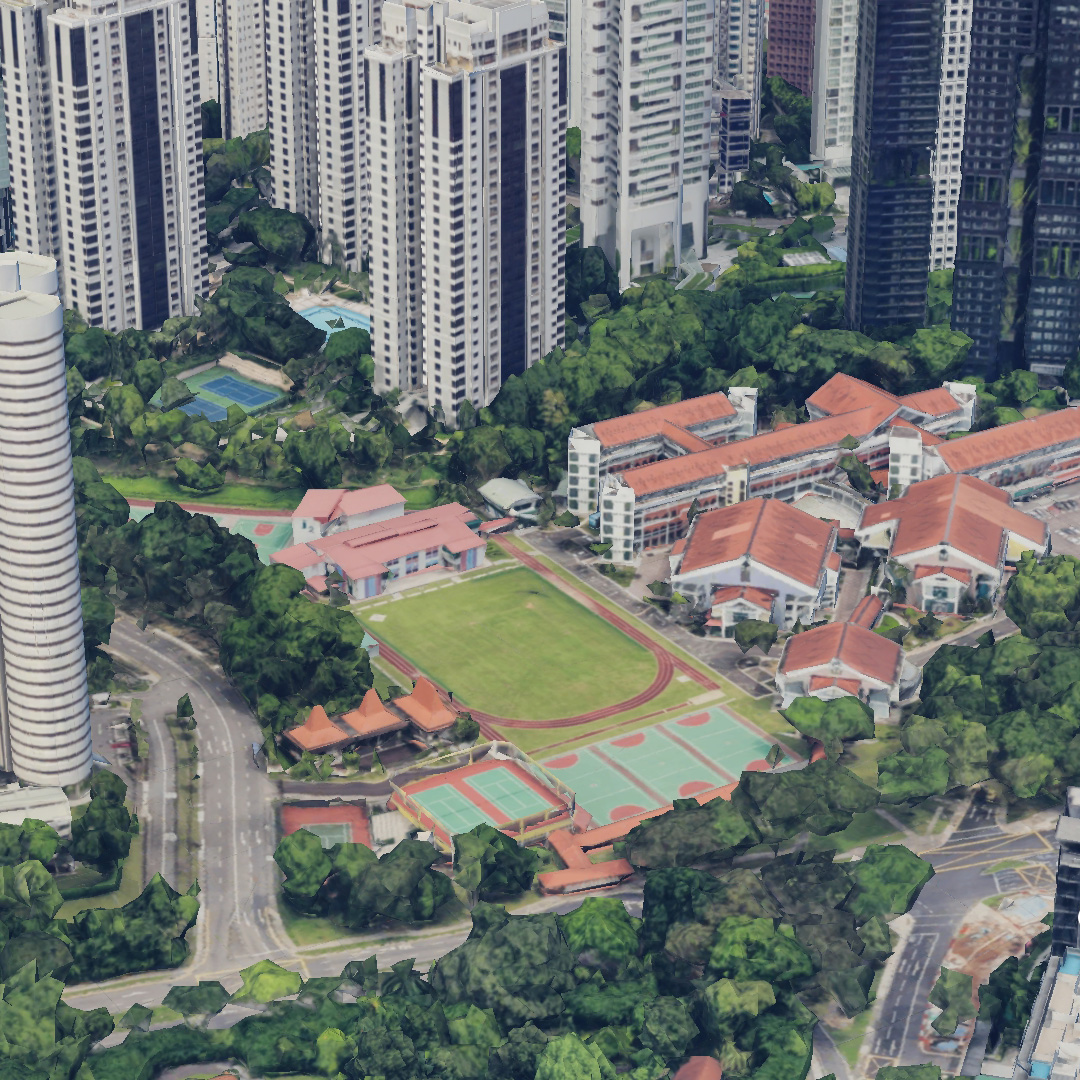Hothouse’s PRIMAL INSTINCT confronts the theme of pure intention through a trans-disciplinary lens — an approach not born of method, but of necessity, shaped by the velocity and violence of the now. This is not an exercise in critique, but in compression — where understanding moves beyond the analytical and becomes a reckoning: emotional, pressurised, and yet strangely clarifying. The photosynthescript that is ‘Nature’ is no longer a neutral backdrop, but a fractured archive of possibility. We subvert the idea of (one-)nature not with answers, but with gestures to gradually replace it with a multiplicity of models grafted and woven in its cracks. This is not an appeal to idealism, but a recognition of what already is: tangled, emergent, and forever forking paths. These cracks are not simply structural flaws, but generative spaces: signs of strain in the imposed coherence of a singular worldview. They are the places where tension accumulates, where the fiction of unity shows it can split, where suppressed knowledges, alternative ecologies, and hybrid ontologies find room to surface. Cracks become not a symbol of failure, but a site of possibility, as they speak other languages, they are not direct interruptions of the master’s discourse, they are points of diffraction, sort of movable topologies difficult to represent. We are interested in finding those moments of intensification, to have a peek at what hides beyond, running parallel to, subjected to, yet countering, the bluntness of a pure intention. We are lured towards that that ultimately gets things in motion: the latent drives, the sub-versions kicking, the PRIMAL INSTINCT and informal strategies of re-production, myths of re-definition, possibly minor acts/sites, indexes showing the possibility of radical inventions and activations, art speaking through primal screams, pointing to or gesturing towards a certain ontological rebelling. Cracks and folds are to be discovered for marking the entry points, or the curvatures for unruly growth. They are meta-static fissures, allowing a polyphony of perspectives to take root and sprawl — for a subtle yet radical rewilding of thought.
PRIMAL INSTINCT, our curatorial framework, is thus a manifesto to analyse and question the monolithic, orderly and tamed definition of “nature” (the model of nature) embraced through leaps of “pure intention” — the moves foundational to the nation-state's vision of becoming a planetary reference point: a Garden City. The (one-)nature of the designed garden brutally strips (other-)nature(s) of its potential openness, of the virtual possibility of true unpredictability, and of course, of the sublime and uncanny beauty of the inform, the deformed, the transformed. We looked and searched for instincts, to select ultimately a few, to subvert and reimagine this (one-)nature, to activate (an-other-)natures, promoting definitions that defy ideological containment. Three instinctual responses were therefore selected to be part of our curatorial framework, three very different yet possibly converging models of nature: Field Notes & the Ecology of Chance [Tini Aliman], TOTAL-PLEASURE-SUITE [Elizabeth Gabrielle Lee] and Square Forest [Salad Dressing].
14 posts
View by
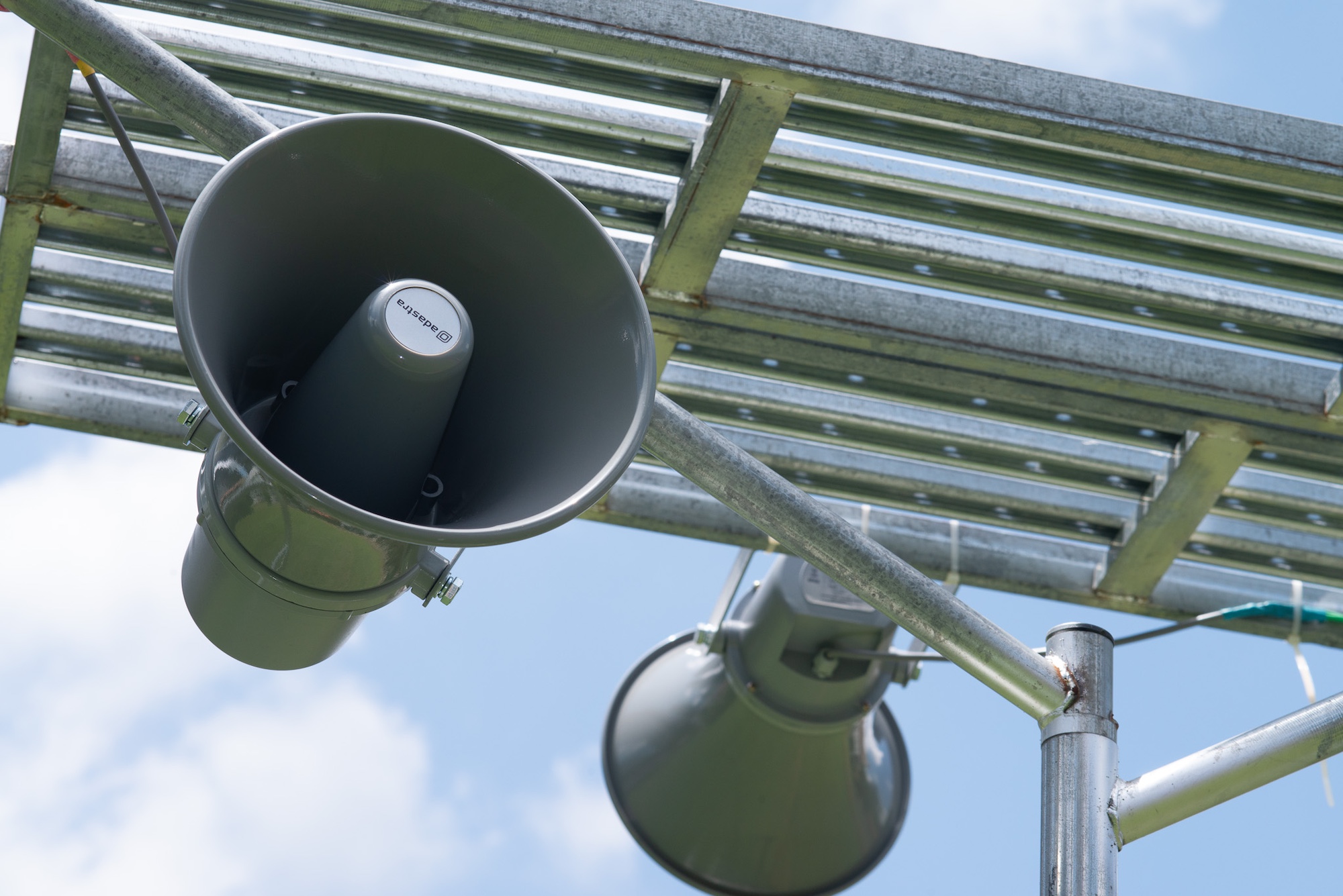
Tini Aliman
Field Notes & the Ecology of Chance (2025)
Stainless steel, aluminium & soil
Field Notes & the Ecology of Chance unfolds at the confluence of acoustic ecology, environmental history, and decolonial sound practice. Informed by Singapore’s botanical colonial legacy and rapid urban transformation, the installation uses field recording, archival research, and spatial sound to uncover what is termed “colonial acoustemologies”— sonic knowledge systems rooted in imperial control. This practice reframes listening as a mode of resistance and relationality, transforming technologies of capture into instruments of re-sounding, return, and ecological speculation. The installation functions as a speculative instrument of listening, proposing a mode of sonic engagement that resists colonial taxonomies and reclaims sound as a relational, embodied method, an infrastructure for catalysing care and memory.
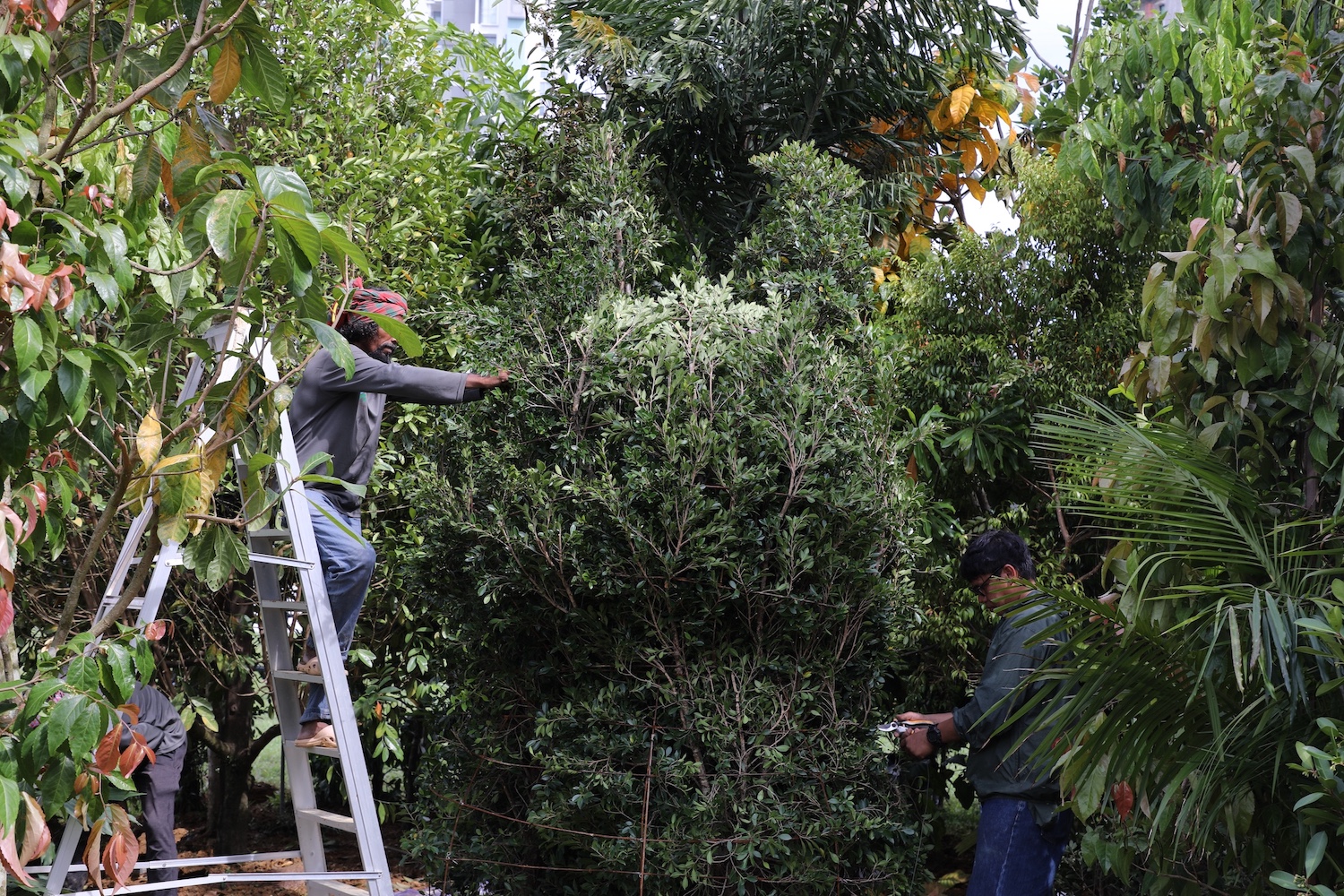
Salad Dressing
Square Forest (2025)
90 native plant species of Singapore
Square Forest is an inquiry into the ethics of rewilding, displacement, and spiritual ecology within the Anthropocene. Responding to the paradox of the “City in Nature” initiative — where native biodiversity is restored through the importation of wilderness — the work interrogates the logics of control and domestication underpinning ecological restoration. Drawing from posthuman and decolonial thought, Square Forest treats soil as an archive of more-than-human memory and plants as sessile refugees, vulnerable yet resilient. It asks: can an imported forest ever truly take root, spiritually or ecologically, in a land remade by capital? And if plants had a voice, what would they say of exile, adaptation, and longing? In invoking the “sessile instinct,” the work gestures toward a vegetal mode of being — rooted, receptive, and relational — that resists mastery and reclaims belonging through ritual, care, and speculative kinship.
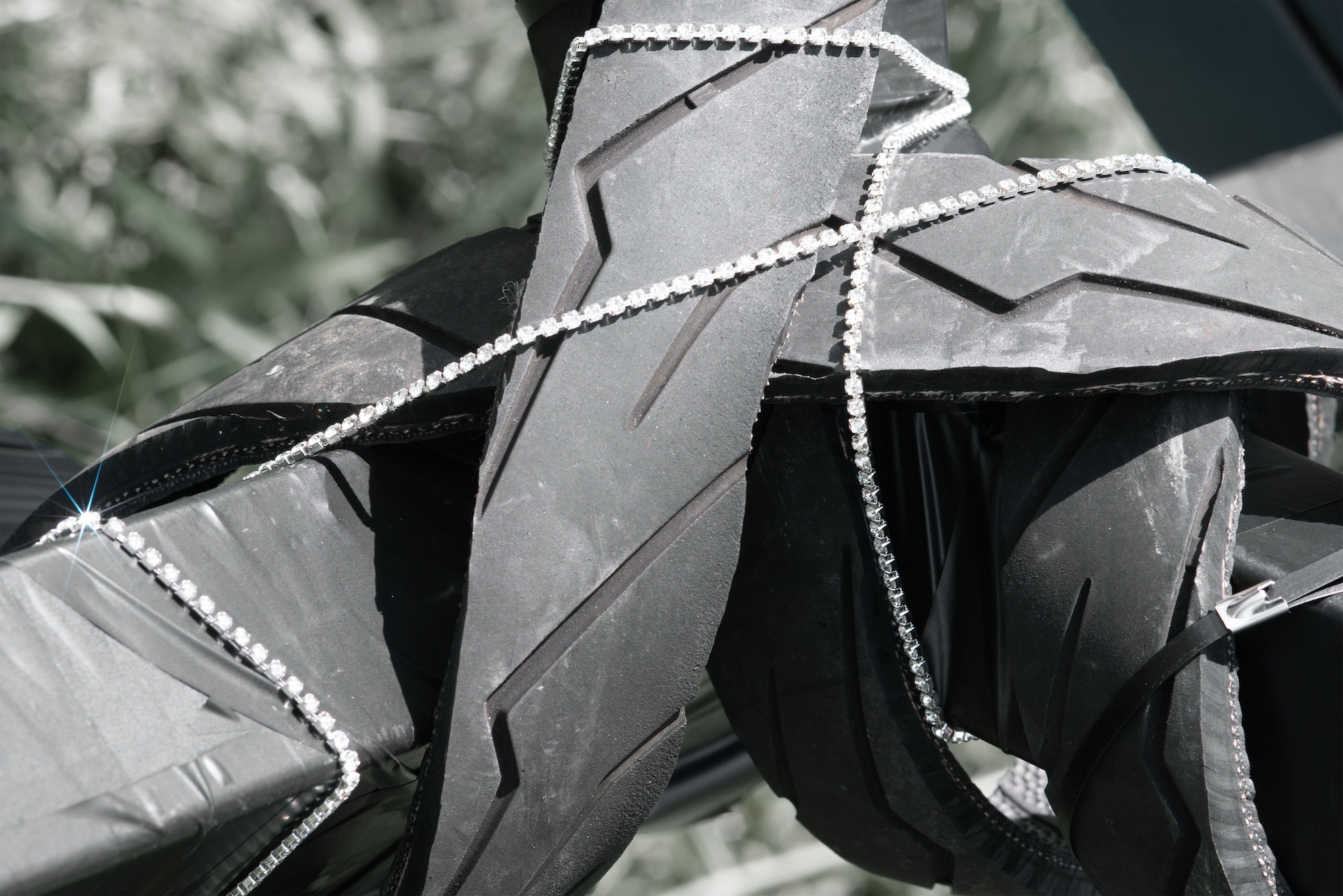
Elizabeth Gabrielle Lee
TOTAL-PLEASURE-SUITE (2025)
School tables, tape, carabiners, cable ties, rubber tyres and diamanté strings
TOTAL-PLEASURE-SUITE reimagines how desire operates within engineered environments shaped by safety, control, and knowability. It challenges the rhetoric of nature as pure and determined by the divine, instead proposing a feral transformation that emerges from entangled ecosystems and material excess. It explores the tension between nostalgia and novelty, between green-washed restoration and techno-futurism, advocating for forgotten pleasures that lie outside dominant narratives of progress.
Everyday objects are transmuted into tools of expression and rebellion, idols, signs of immanent pleasure that get animated by non-normative gestures to confront how desire is managed, repressed, or redirected in public space. It questions whether instincts are pure, or if they are enmeshed in a diffuse, messy, underground, one shaped by sensory and material excess, what the artist calls the “tropical gothic” — a space where flesh, long disciplined by invisible catechisms or any form of realism, reclaims its right to excess, interrupting the dominant systems of order.
PRIMAL INSTINCT: Delirious and Other
In-formal Models of Nature
“My childhood was elegant homes, tree-lined streets, the milkman, building backyard forts, droning airplanes, blue skies, picket fences, green grass, cherry trees. Middle America as it's supposed to be. But on the cherry tree, there's this pitch oozing out—some black, some yellow—and millions of red ants crawling all over it. I discovered that if one looks a little closer at this beautiful world, there are always red ants underneath.” […] “I learned that just beneath the surface there's another world, and still different worlds as you dig deeper. I knew it as a kid, but I couldn't find the proof. It was just a kind of feeling. There is goodness in blue skies and flowers, but another force—a wild pain and decay—also accompanies everything.” – David Lynch¹
“Noise cannot be a phenomenon; every phenomenon is separated from it, a silhouette on a backdrop, like a beacon against the fog, as every message, every cry, every call, every signal must be separated from the hubbub that occupies silence, in order to be, to be perceived, to be known... As soon as a phenomenon appears, it leaves the noise; as soon as a form looms up, or pokes through, it reveals itself by veiling the noise. So noise is not a matter of phenomenology, but of being itself.” – Michel Serres²
The Designed Garden and Other Forms of Nature
What forms of nature—inconvenient or resistant—were erased, tamed or ignored in the creation of our landscaped utopia? What tangled histories, buried ecologies and ungovernable voices haunt the cracks of the (one-)nature imposed by design? How might we reimagine nature through hybrid, emergent and impure models that resist commodification, purity, and control? What alternative rituals, instincts and material encounters could reopen space for contingency, unpredictability and ecological plurality? How can human and more-than-human actors navigate spaces freed from premeditation and imposed order, allowing for unregulated growth and entangled belonging? ³ Taken together, these questions form not a map, but the setting of terrain in motion. Hothouse sets forth this framework for another nature to speak, asking what kinds of alternative growth might take root in the fractures of our designed environments, if space is left for other natures and PRIMAL INSTINCT to emerge.
The Cracks of (One-)Nature — What Leaks Through Refusal
PRIMAL INSTINCT opens another relation to pure intention through a transdisciplinary lens—an approach not born of method but of necessity, shaped by the velocity and violence of the now. This is not an exercise in critique but in compression—where understanding moves beyond the analytical and becomes a reckoning: emotional, pressurised, and yet strangely clarifying. The photosynthescript that is “Nature” is no longer a neutral backdrop; it has become a fractured archive of possibility. We subvert the idea of (one-)nature ⁴ not with answers but with gestures that gradually replace it with a multiplicity of models grafted and woven into its cracks. This is not an appeal to idealism but a recognition of what already is: tangled, emergent and forever forking paths. These cracks are not simply structural flaws but generative spaces: signs of strain in the imposed coherence of a singular worldview. They are places where tension accumulates, where the fiction of unity shows its fiction, where suppressed knowledge, alternative ecologies and hybrid ontologies surface. Cracks become not symbols of failure but sites of possibility.
Points of rupture are foreign by default. They are not direct interruptions of the master’s discourse but inflections—points of diffraction. They are movable topologies, non-identities which are difficult to represent. We are interested in finding those moments of intensification, to have a peek at what hides beyond, running parallel to, subjected to, yet countering the bluntness of a pure intention. We are lured towards what ultimately gets things in motion: latent drives, subversions kicking, the PRIMAL INSTINCT and informal strategies of reproduction, myths of redefinition, …possibly minor acts and marginal sites, indexes showing the possibility of radical inventions and activations, art speaking through primal screams, pointing to or gesturing towards a certain ontological rebellion. Cracks and folds are entry points, the topological complexity or point of rupture for unruly growth. They are metastatic fissures, allowing a polyphony of perspectives to take root and sprawl—for a subtle yet radical rewilding of thought.
An invitation is extended to enter terrains where nature is no longer singular or polished, but multiple, unresolved and insistently alive. We begin from the recognition that the leaps of pure intention—so foundational to the nation-state’s Garden City vision—were not neutral gestures, but acts that narrowed the field of possibility, that set boundaries on what could be seen, felt, or allowed to grow. In this (one-)nature of the designed garden, other potential natures were stripped away: the unpredictable, the deformed, the uncanny, the sublime.
Against this backdrop, we searched for instincts—not as answers, but as cracks and countercurrents, in-formalities ⁵ through which alternative natures might surface. From this search came three instinctual responses, each proposing its own model of nature: Field Notes & the Ecology of Chance, TOTAL-PLEASURE-SUITE and Square Forest. Though divergent in form, they converge in their refusal of containment, offering ways to sense what lies beyond the monolithic coherence of a singular “nature.”
The field sits in suspension. Once the site of formal education—trimmed hedges, ordered timetables, the measured repetition of drills—it now waits, unsure whether the next gesture will be preservation or erasure. Raffles Girls’ School: the name carries the layered weight of colonial commemoration and the nation’s own elite histories, its playing fields long used to train discipline, stamina and collective display. Today, the grass is left to its own rhythm, neither fully wild nor entirely maintained—an in-between that resists certainty.
In this pause, three works have taken root. They are not posed as answers or puzzles to be solved. They remain open to shifting encounters—appearing, in different moments, as interruptions, echoes, or temporary definitions.
From across the expanse, a towering cube of green draws the eye—Square Forest by Salad Dressing—its trees rising well above head height, their canopy forming a dense, shaded volume. Approaching, the temperature drops, light fractures, and the atmosphere turns inward. The perimeter is visually dense and seemingly impenetrable, prompting hesitation and detour. One finds an entrance, and at the volume’s heart, a large, unmoving figure shaped from foliage—a lucky cat—anchors the space. Severe in outline yet porous to the elements, it sits as both guardian and witness. The forest’s stillness carries its own pressure, a sense of endurance that is as contemplative yet unyielding.
Nearby, Field Notes & the Ecology of Chance by Tini Aliman takes shape as a loose ring of stainless steel poles etched with random numbers and embedded in the earth, their surfaces catching the sun briefly before sliding back into shadow. Rising at their centre is a mast fitted with four horn speakers, each facing a cardinal direction. At intervals, bird calls break the air—familiar yet never quite belonging to this moment. The sound slips from different directions, displacing the present with echoes of other hours, other landscapes, other histories—temporalities and identities.
Further along the grass, skeletal metal frames mark the ground—TOTAL-PLEASURE-SUITE by Elizabeth Gabrielle Lee. The components, once the most ordinary of canteen tables, have been unscrewed, disassembled and reconfigured into lean, repetitive structures. Their linear discipline is softened by small irregularities: tilts, bunches, the occasional leaning away. The table frames recall their former service without nostalgia, their current form slipping between architecture and choreography, workaday object and improbable ornament.
For some, this may suggest how the neatness of planned landscapes often mutes the vivid saturation of what is patchy or leftover. (One-)nature makes it difficult to encounter these residues—objects, sounds or fragments that do not fit the design—yet it is precisely in such encounters that the possibility of instinctive gestures arises. What altars could be assembled from mud, from chance fragments, from stray acoustics?
An audience might come to sense how (one-)nature, with its norms and standards, restricts such possibilities, standardising value and forbidding serendipity. In this light, the cancelled encounter, the wasted time, even the instinctive impulse to repurpose or misuse, become part of what is repressed. Perhaps then, what emerges is not a fixed conclusion but an open question: what does it mean for spontaneity, for contingency itself, to be disallowed by (one-)nature?
“Nature” is at once all and nothing, a prism of complexity, a constellation of concealed models awaiting exploration and collective redefinition. It is a cipher—generic and open at its base, yet always inscribed with multiplicities within its folds. What matters is not the recovery of a singular truth, but the emergence of alternative modes of speaking and making nature, to see what blossoms through hybrid interpretations and representations, by attending to the marginal characters left aside when one model (of nature) is privileged over the very many left aside.
We are interested in the collective dimension of definition, in the acts of translation, invention, and negotiation that bring new social and environmental ecologies into being. Nature—entropy, necessity, feral drives—and the human—story, abstraction, feral drives—stand here as co-constitutive forces, entwined in a dance between unpredictability and structure. To be human is not only to chase rational progress but to honour the unknown, to stay with what is fragile, futile, or unresolved, and to discover meaning within unlikely motions. In this light, the works become both elegy and invocation—a quiet rebellion against the tyranny of certainty.
On Site: Former Raffles Girls’ School Field—You Built This, It Doesn’t Care
The site is marginal, an informal infrastructure, strangely liminal—neither abandoned nor fully tended. The former Raffles Girls’ School field remains after the school has moved, a patch of ground now loosened from the regimentation of drills and chalked lines. The grass is uneven, untrimmed, brimming with weeds and untamed growth. Trees edge its perimeter, and the surface carries faint echoes of its past: the memory of games, the discipline of routine, the performance of order. Without daily care, it has softened, rewilded in parts, and begun to drift towards entropy.
In it, with it, on it, we envision a mediated occupation of a field unshackled from precision—a ground open to the chance of becoming. This is not mere abandonment but a deliberate inquiry into the tension between control and autonomy. What might flourish when systems of dominance are surrendered? How do human and more-than-human actors navigate uncharted ecologies, where time and change carve their paths unchecked?
The gesture—of letting go of control, of reframing, rewilding, shifting, parasitising ⁶—becomes both conceptual and visceral: an ode to ecological autonomy, primal impulse, and the infinite possibilities of contingency—the unregulated. It asks us to reconsider the entangled relationships between species, spaces and the forces that bind and unbind them. What was built persists, but it does not care.
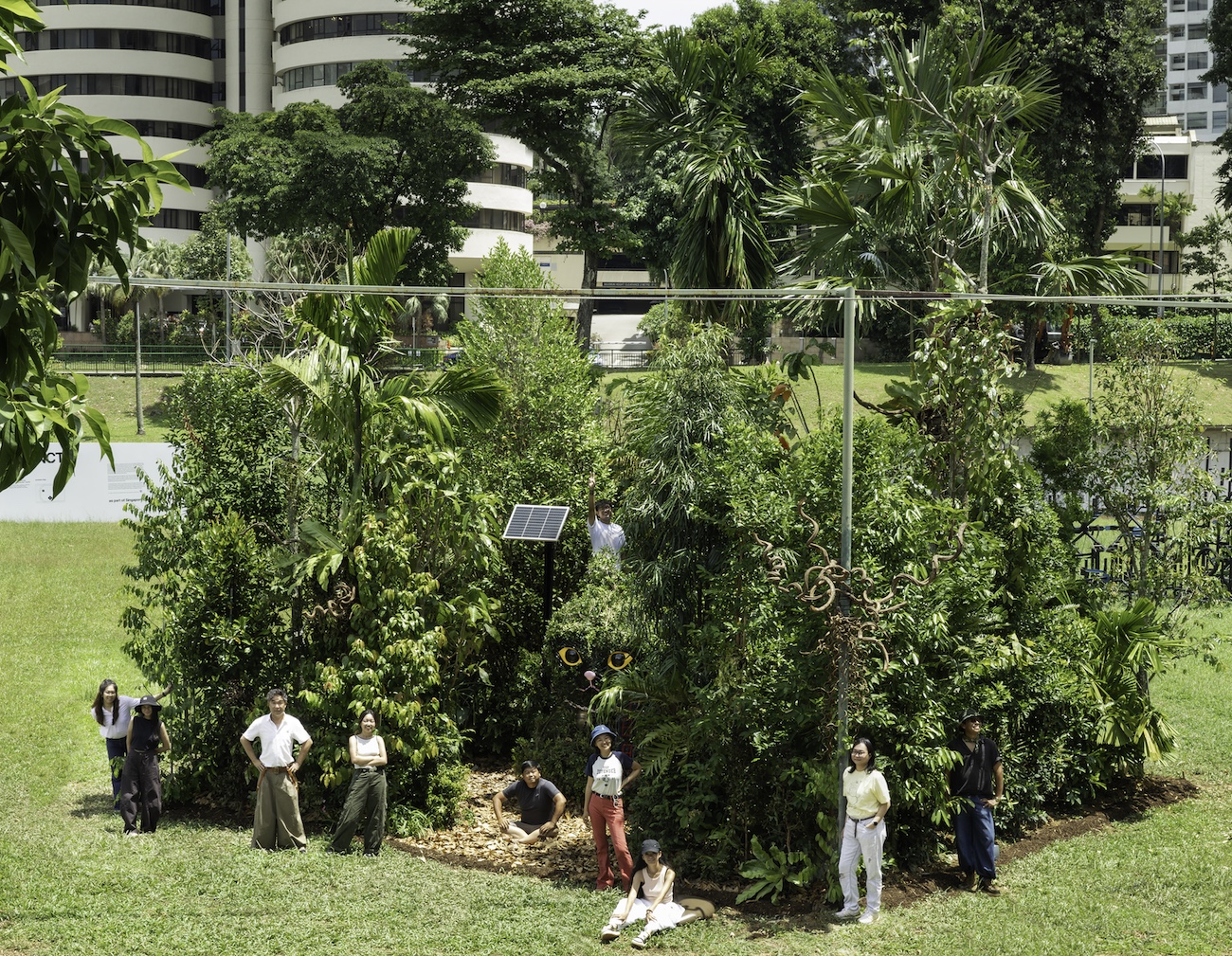
Salad Dressing Team with Square Forest (2025)
Intention and Instinct
Singapore, a city built on ingenuity, has lost more than 95% of its native forests and nearly 40% of its biodiversity over the past two centuries. To soften this loss, the nation has spent the last fifty years greening its streets and parks—often by importing plants from elsewhere.
Yet this creates a paradox. To become a City in Nature, Singapore must purchase fragments of nature from abroad to replace what urban growth has erased. Can nature truly be imported? Is greening an act of pure intention, or does it speak to something deeper—our primal instinct to return to the earth?
A Lucky Cat in a Square Forest
Within a 9m x 9m Square Forest, 90 native species imported from Malaysia surround a giant bonsai-like lucky cat. One paw gathers sunlight through a panel, the other clutches coins that flicker with four numbers drawn from weather. The lucky cat is not instinctive; it is a cultural artefact, a kitsch totem of luck and commerce. Yet what it triggers is more primal: the sudden surge of anticipation in the body, the dopamine-fueled spark that bypasses rationality and latches onto chance.
Both the cat and the square forest are split forms. The cat’s raised paw is a pure intention of luck, yet behind it lies the circuitry of desire and risk. The forest, too, begins as a designed square, but its instinct presses back, swelling, consuming form into matter. Together they stage a tension between culture’s clarity and nature’s appetite—revealing how intention and instinct are never separate, only folded into one another
A Smug Grin Left Behind
Vines curl like serpents, branches fork like antlers—prosthetic devices coaxing this domesticated garden toward wildness, a playground for the unchained mind.
In time, the lucky cat itself will grow wild, dissolve and be absorbed into the imploding forest, leaving behind only an enigmatic trace-- and a smug grin. Yet the numbers persist, endlessly generated by sun and weather.
In this loop of energy and chance, a fleeting tutelage is transfigured into a profuse algorithmic blessing, intention dissolving into instinct, yet sustaining belief in untamed nature. But when the cat is swallowed in the square, what truly remains—sacredness, superstition, or only our own need to believe?
